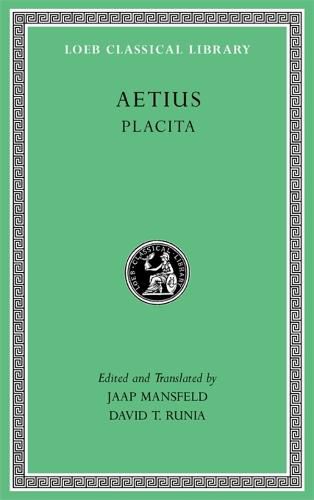Readings Newsletter
Become a Readings Member to make your shopping experience even easier.
Sign in or sign up for free!
You’re not far away from qualifying for FREE standard shipping within Australia
You’ve qualified for FREE standard shipping within Australia
The cart is loading…






An ancient compendium of ancient philosophy.
Placita (Tenets), generally attributed to an author named Aetius and dating from the late first or early second century AD, was a compendium setting out in summary fashion the principal doctrines and opinions of philosophers and philosophical schools in response to questions and topics in the domain of natural philosophy. Now lost, Placita can be largely reconstructed from the work of three authors working in the period from the second to the fifth century (Pseudo-Plutarch, Stobaeus, and Theodoret) who quote from it extensively.
Placita is organized into five books: First Principles; Cosmology; Meteorology and the Earth; Psychology; and Physiology. Each chapter contains a list of short opinions or tenets, which are ascribed to an individual philosopher and/or school and usually arranged in sections that stress the variety and contrast of the teachings concerned.
Designed as a multi-purpose resource, Placita long served as a manual of neatly packaged doxographic material on a wide variety of topics, to be used for study, as an aide-memoire, for displays of erudition, for persuasion in rhetorical or apologetic contexts, and for personal enlightenment, and it remains a valuable source for our knowledge of Presocratic and Hellenistic philosophy.
This edition of Aetius' Placita offers a fresh translation, ample annotation, and a text fully informed by the latest scholarship.
$9.00 standard shipping within Australia
FREE standard shipping within Australia for orders over $100.00
Express & International shipping calculated at checkout
An ancient compendium of ancient philosophy.
Placita (Tenets), generally attributed to an author named Aetius and dating from the late first or early second century AD, was a compendium setting out in summary fashion the principal doctrines and opinions of philosophers and philosophical schools in response to questions and topics in the domain of natural philosophy. Now lost, Placita can be largely reconstructed from the work of three authors working in the period from the second to the fifth century (Pseudo-Plutarch, Stobaeus, and Theodoret) who quote from it extensively.
Placita is organized into five books: First Principles; Cosmology; Meteorology and the Earth; Psychology; and Physiology. Each chapter contains a list of short opinions or tenets, which are ascribed to an individual philosopher and/or school and usually arranged in sections that stress the variety and contrast of the teachings concerned.
Designed as a multi-purpose resource, Placita long served as a manual of neatly packaged doxographic material on a wide variety of topics, to be used for study, as an aide-memoire, for displays of erudition, for persuasion in rhetorical or apologetic contexts, and for personal enlightenment, and it remains a valuable source for our knowledge of Presocratic and Hellenistic philosophy.
This edition of Aetius' Placita offers a fresh translation, ample annotation, and a text fully informed by the latest scholarship.